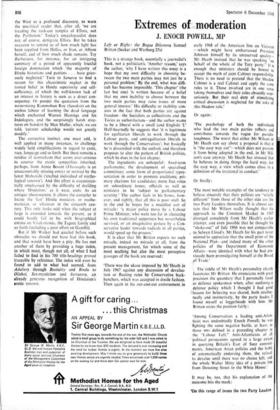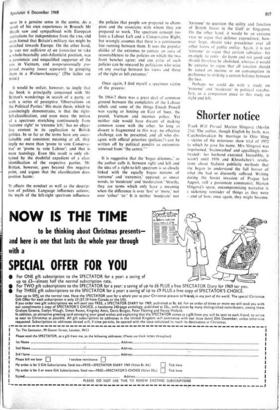Extremes of moderation
J. ENOCH POWELL, MP This is a strange book, essentially a journalist's book, not a politician's. 'Another reason,' says the author, 'why I have written this essay is a hope that my own difficulty in choosing be- tween the two main parties may not just be a personal problem.' By the end, what was diffi- cult has become impossible. 'This chapter' (the last but one) 'is written because of a belief that my own inability to choose between the two main parties may raise issues of more general interest.' His difficulty or inability. con- sists in the fact that both parties are against freedom—the Socialists as collectivists and the Tories as authoritarians—and the author wants to be a liberal with a small (and English) 'I.' Half-heartedly he suggests that 'it is legitimate for egalitarian liberals to work through the Labour party, and anti-egalitarian liberals to work through the Conservatives': but basically he is dissatisfied with the outlook and therefore proposes to alter the pattern of British politics, which he does in the last chapter.
The ingredients are unhopeful : fixed-term parliaments; the development of specialised committees; some form of proportional repre- sentation in order to promote coalitions; pri- mary elections for candidates; more free, votes on subordinate issues; officials as well as ministers to be 'subject to parliamentary scrutiny.' The author feels in his bones, how- ever, and rightly, that all this is poor stuff. So in the end he hopes for a muddled sort of miracle: 'a major policy move by a Labour Prime Minister, who went too far in alienating his own traditional supporters but nevertheless survived, or an imaginative gesture by a Con- servative leader towards radicals in all parties, would speed up the process.'
It is clear that Mr Brittan expects no such miracle, indeed no miracle at all, from the present management, for which some of the most scathing but also the most perceptive passages of the book are reserved:
`There was the ukase imposed by Mr-Heath in July 1967 against any discussion of devalua- tion or floating rates by Conservative back- benchers, which was accepted in docile fashion. Then again in his out-and-out endorsement in early 1968 of the American line on Vietnam —which might have embarrassed President Johnson himself by its unreserved quality Mr Heath insisted that he was speaking "on behalf of the whole of the Tory party." It is enough that ministers should be bound to
• accept the myth of joint Cabinet responsibility. There is no need to pretend that the Shadow Cabinet is a real Cabinet and apply the same rules to it. Those involved are in one sense taking themselves and their roles absurdly over. seriously. But their real duty of stimulating critical discussion is neglected for the sake of • this Shadow role.'
Or again:
'The psychology of both the individuals who lead the two main parties reflects and contributes towards the vogue for pseudo- toughness. The worst that either Mr Wilson or Mr Heath can say about a proposal is that it is "the easy way out"—which does not prevent it from being adopted in the end, in Mr. Wil- son's case anyway. Mr Heath has stressed that he believes in doing things the hard way, not the easy way, a view which comes close to a definition of the irrational in conduct.'
Or finally:
'The most notable examples of the tendency to believe sincerely that their policies are "utte.rly different" from those of the other side are the two Party Leaders themselves. It is almost cer- tain that Mr Wilson really thought that his approach to the Common Market in 1967 diverged completely from Mr heath's earlier attempt, and even possible that he thought his "shake-out" of July 1966 was not comparable , to ,Selwyn Lloyd's. Mr Heath for his part never seemed to appreciate that the small print of the National Plan—and indeed many of the other policies of the Department of Economic Affairs—were identical with what he had pre- viously been promulgating himself at the Board of Trade.'
• The riddle of Mr Heath's personality clearly fascinates Mr Brittan. He enunciates with great precision the quandary that I personally faced as defence spokesman when, after outlining a defence policy which I thought I had good -'reason for believing was shared, both intellec- tually and instinctively, by the party leader, I found myself at loggerheads with him. Mr Brittan states the position fairly:
'Among Conservatives a leading anti-Atlan- ticist was undoubtedly Enoch Powell; he was Aghting the same negative battle, at least, as those MPS defined in a preceding chapter as the "Labour Left." Anti-Atlanticists of all -political persuasions agreed to a large extent in querying Britain's East of Suez commit- ments, American Asian policies and the habit of automatically endorsing them, the refusal to devalue until there was no choice left, and the whole Walter Mitty idea of a private line from Downing Street to the White House.'
It may be, too, that his explanation of the outcome hits the mark: 'On this range of issues the two Party Leaden
were in a genuine sense in the centre. As a result of his own experiences in Brussels Mr Heath saw and sympathised with European aspirations for independence from the USA, and even hinted that Britain's military ties might be switched towards Europe. On the other hand, he was not sufficient of an iconoclast to take a whole-heartedly anti-Atlanticist position, was a passionate and unqualified supporter of the USA in Vietnam, and temperamentally pre- ferred treating issues separately to grouping them in a Weltanschauung.' (The italics are mine.)
It would be unfair, however, to imply that the book is principally concerned with Mr 'Brittan's wanderings in search of a party, or
• with a series of perceptive 'Observations on the Political Parties.' His main thesis, which he convincingly demonstrates, is that the right- left-classification, and even more the notion of a ,spectrum stretching continuously from 'extreme right' to 'extreme left,' has no objec- tive content in its application to British politics. In so far as the terms have any ascer- tainable and consistent meaning at all, they imply no more than 'prone to vote Conserva- tive' or 'prone to vote Labour', and that is mere tautology. Even this result is only ob- tained by the doubtful expedient of a class identification of the respective parties. Mr Brittan, however, goes beyond this negative point, and argues that the classification does positive harm:
'It affects the conduct as well as the descrip- tion of politics. Language influences actions; the myth of the left-right spectrum influences the policies that people are prepared to cham- pion and the associates with whom they are prepared to work. The spectrum concept iso- lates a Labour Left and a Conservative Right, but wrongly assumes that there is a continuous line running between them. It uses the popular dislike of the extremes to convey an aura of reasonableness to the policies on which the two front benches agree; and any critic of such policies can be smeared by politicians who seize on any overlap between his views and those of the right or left extremes.'
Once again, I find myself a specimen victim of the process:
'In 1964-7 there was a great deal of common ground between the complaints of the Labour rebels and some of the things Enoch Powell was saying or hinting on East of Suez, the pound, Vietnam and incomes policy. Yet neither side would have dreamt of making common cause with the other. So long as dissent is fragmented in this way, no effective challenge can be presented, and all who dis- agree with official priorities (policies?) can be written off by political pundits as extremists removed from "the centre."' It is suggestive that the 'bogus dilemma,' as the author calls it, between right and left and the idea of a right-to-left spectrum is so closely linked with the equally bogus notions of 'extreme' and 'extremist,' opposed, as smear words, to `moderate' and 'moderation.' Strictly, they are terms which only have a meaning when the difference is over 'less' or 'more,' not over 'either' or.' It is neither 'moderate' nor 'extreme' to question the utility and function of British forces in the Gulf or Singapore. On the other hand, it Would be an extreme view to argue that defence expenditure, how- ever large, should take precedence over all other forms of public outlay. Again, it is not 'extreme' to argue that certain subsidies—for example, to rents -do harm and not good and should therefore be abolished, whereas it would be extreme to argue that all taxation should be raised on income or on consumption in preference to striking a certain balance between the two.
Perhaps we could do with a study on 'extreme' and 'moderate' in political vocabu- lary, as a companion piece to this study on right and left.



































 Previous page
Previous page